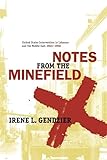Notes from the Minefield : United States Intervention in Lebanon, 1945-1958 / Irene Gendzier.
Material type: TextSeries: History and Society of the Modern Middle EastPublisher: New York, NY : Columbia University Press, [2006]Copyright date: ©2006Edition: With a new prefaceDescription: 1 online resource (520 p.) : 3 mapsContent type:
TextSeries: History and Society of the Modern Middle EastPublisher: New York, NY : Columbia University Press, [2006]Copyright date: ©2006Edition: With a new prefaceDescription: 1 online resource (520 p.) : 3 mapsContent type: - 9780231140119
- 9780231511605
- 327.7305609/045 22
- DS63.2.U5 G43 2006
- DS63.2.U5 G43 2006eb
- online - DeGruyter
- Issued also in print.
| Item type | Current library | Call number | URL | Status | Notes | Barcode | |
|---|---|---|---|---|---|---|---|
 eBook
eBook
|
Biblioteca "Angelicum" Pont. Univ. S.Tommaso d'Aquino Nuvola online | online - DeGruyter (Browse shelf(Opens below)) | Online access | Not for loan (Accesso limitato) | Accesso per gli utenti autorizzati / Access for authorized users | (dgr)9780231511605 |
Frontmatter -- Contents -- List of Maps and Illustrations -- Preface -- Preface to the 2006 Edition -- Part I. The Setting of U.S. Policy -- 1. The Dynamic of Collaborative Intervention -- 2. U.S. Postwar Policy and the Middle East -- 3. Learning Lebanon: A Primer -- Part II. Formative Years in the Evolution of U.S. Policy: 1944-1952 -- 4. Alternating Currents of Criticism and Conformity -- 5. The Foundations of U.S. Policy, PACLIFT: Petroleum, Aviation, Commerce, Labor, Intelligence, and the Friendship Treaty -- 6. Altered Circumstances and the Design of U.S. Political Strategy -- Part III. The Eisenhower Administration and the Sham'un Regime: A Policy of Information and Consent -- 7. Pressure Points and Priorities -- 8. Lebanon: The "Bridgehead in the Orient" -- 9. Realities of Power in the "Rear Area" -- 10. Our Man in Beirut -- Part IV. Intervening Before Intervention -- 11. Civil War, May 1958 -- 12. Doubt, Deliberation, and Preparation -- Part V. The Minefield Explodes: U.S. Military Intervention -- 13. 11,000 Sorties in Search of a Target -- 14. By Mutual Consent: July-October 1958 -- Epilogue: 1958 in Retrospect -- Notes -- Bibliography -- Index
restricted access online access with authorization star
http://purl.org/coar/access_right/c_16ec
Irene Gendzier's critically acclaimed, wide-reaching analysis of post-World War II U.S. policy in Lebanon posits that the politics of oil and pipelines figured far more significantly in U.S. relations with Lebanon than previously believed. In 1958 the United States sent thousands of troops to shore up the Lebanese regime in the face of domestic opposition and civil war. The justification was preventing a coup in Iraq, but recently declassified documents show that the true objective was to protect America's commercial, political, and strategic interests in Beirut and the Middle East. By reevaluating U.S.-Lebanese relations within the context of America's collaborative intervention with the Lebanese ruling elite, Gendzier aptly demonstrates how oil, power, and politics drove U.S. policy and influenced the development of the state and the region. In her new preface, Gendzier discusses the U.S. invasion of Iraq in 2003 and the remarkable continuity of U.S. foreign policy from 1945 to the present.
Issued also in print.
Mode of access: Internet via World Wide Web.
In English.
Description based on online resource; title from PDF title page (publisher's Web site, viewed 02. Mrz 2022)


